Did you know nearly 2 in 5 people may be walking around with low vitamin B12 and not even realize it? While fatigue and brain fog are common symptoms, there’s a deeper concern many overlook—can vitamin B12 deficiency be a sign of cancer? Research shows a potential link between low B12 levels and certain cancers like stomach or colorectal cancer. Since B12 plays a critical role in DNA synthesis and cell repair, a deficiency might be your body’s early alarm bell.
That’s why understanding this connection isn’t just helpful—it could be life-saving. Here’s what you need to know…
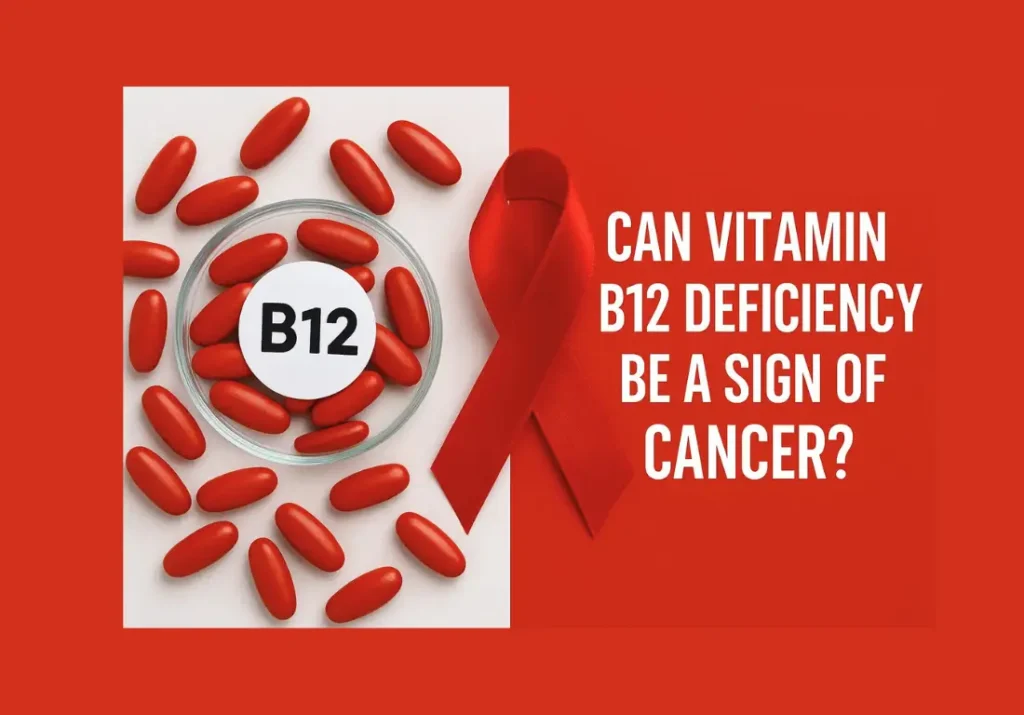
Key Takeaways
- Vitamin B12 deficiency affects around 40% of Americans.
- Deficiency in B12 could be an early warning sign of certain cancers like stomach and colorectal cancer.
- Recognizing the symptoms of B12 deficiency is crucial for early detection.
- Vitamin B12 is essential for DNA synthesis and cell repair.
- Early testing and diagnosis are key in managing potential cancer symptoms.
Understanding Vitamin B12 Deficiency
Vitamin B12, also known as cobalamin, is a key nutrient for our bodies. It helps make red blood cells, keeps nerves working right, and makes DNA. A vitamin b12 deficiency can cause big health problems.
Conditions like pernicious anemia and megaloblastic anemia may happen. Knowing the signs and symptoms of this deficiency is key. It helps in early detection and treatment.
What is Vitamin B12?
Vitamin B12 is a needed nutrient found in animal foods like meat and fish. It’s also in dairy and eggs. But it’s not in plant foods, so vegans and vegetarians might not get enough.
This deficiency can mess up many body functions. It affects your overall health.
Common Symptoms of B12 Deficiency
The signs of a vitamin b12 deficiency can be different for everyone. They often hit different parts of the body. You might feel tired or weak. You might have numb or tingling hands and feet.
Fatigue and weakness are common signs. Some people have trouble with their memory or can’t focus well. In bad cases, it can cause pernicious anemia and megaloblastic anemia. Recognizing these symptoms early can stop worse health problems.
Causes of Vitamin B12 Deficiency
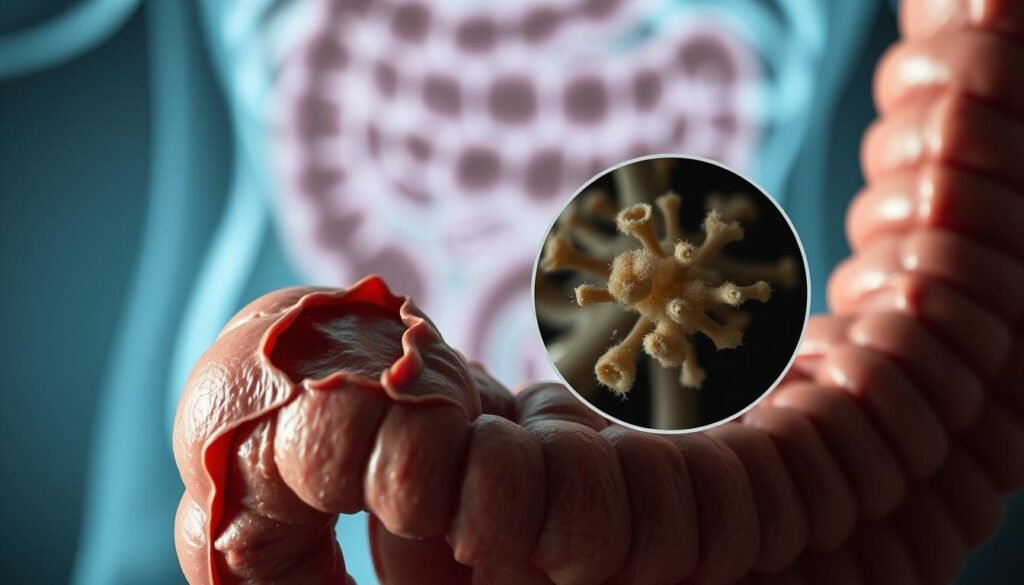
It’s important to know why Vitamin B12 deficiency happens for good health. Many factors can cause it. Knowing these factors helps us manage and prevent the deficiency better.
Dietary Insufficiency
A key reason for Vitamin B12 deficiency is not eating enough of it. People who follow a vegetarian or vegan diet often face this issue. This is because Vitamin B12 is mostly in animal foods. Older people also have this risk because they eat fewer nutrient-rich foods.
Malabsorption Issues
Problems with absorbing Vitamin B12 can lead to deficiency. Diseases like Crohn’s and celiac disease make it hard to absorb nutrients. Also, surgery on the stomach, like weight loss surgery, can stop B12 from being absorbed well.
Age-Related Factors
As people get older, absorbing B12 gets harder. This is a natural part of aging. Certain medicines, like metformin or proton pump inhibitors, make it worse. Autoimmune diseases like pernicious anemia also prevent the body from absorbing Vitamin B12. This makes health issues more complicated for older adults.
Can Vitamin B12 Deficiency Be a Sign of Cancer

Studies show a link between low vitamin B12 and some cancers, mainly in the gut. So, can vitamin B12 deficiency be a sign of cancer? In certain situations, yes. Problems with nutrient absorption can lead to gastric cancer or stomach cancer, impacting vitamin B12 absorption.
Knowing the signs of B12 deficiency symptoms is important. Symptoms like tiredness, weakness, and brain changes may signal bigger problems. With cancers in the gut, tumors can block normal nutrient take-up. This includes vitamin B12.
The connection between gastric cancer and lacking vitamin B12 is key for early cancer discovery. If you often feel B12 deficiency symptoms, seeing a doctor is a good idea. They can check if these signs point to stomach cancer or other gut cancers.
Vitamin B12 Deficiency and Types of Cancer
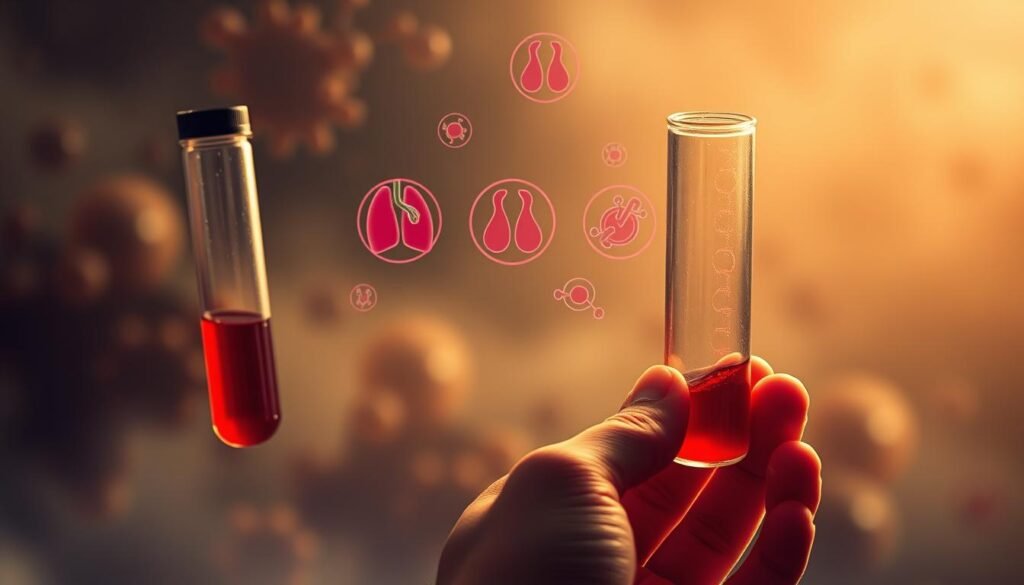
Lacking enough Vitamin B12 can really impact your health. Studies show it’s linked to some cancers like in the stomach, colon, and pancreas. Knowing about this can help you take steps to stay healthy.
Stomach Cancer and Vitamin B12
Stomach cancer can be linked to not having enough B12. This is because stomach issues can make it hard for your body to get B12. Also, B12 is important for your DNA, which affects cancer risk.
Colorectal Cancer and Vitamin B12
Low B12 might raise your chances of getting colorectal cancer. B12 keeps your gut lining healthy. Not having enough can cause problems in your colon. You might need to eat better or take supplements.
Pancreatic Cancer and Vitamin B12
Pancreatic cancer is also related to low B12. The pancreas helps you absorb B12. If it’s not working right, you might not get enough B12. Eating foods rich in B12 could lower your cancer risk.
Other Cancers Related to B12 Deficiency
Other cancers might be connected to not having enough B12 too. It’s important to know this and keep your B12 levels up. This could help prevent cancer.
| Type of Cancer | Impact of B12 Deficiency |
|---|---|
| Stomach Cancer | B12 deficiency impairs DNA repair, increasing cancer risk. |
| Colorectal Cancer | Helps maintain gastrointestinal lining, reducing cancer risk. |
| Pancreatic Cancer | Adequate B12 levels help in reducing risks related to pancreas dysfunction. |
| Other Cancers | Various other cancers may be linked to B12 deficiency. |
Recognizing the Symptoms of B12 Deficiency and Cancer
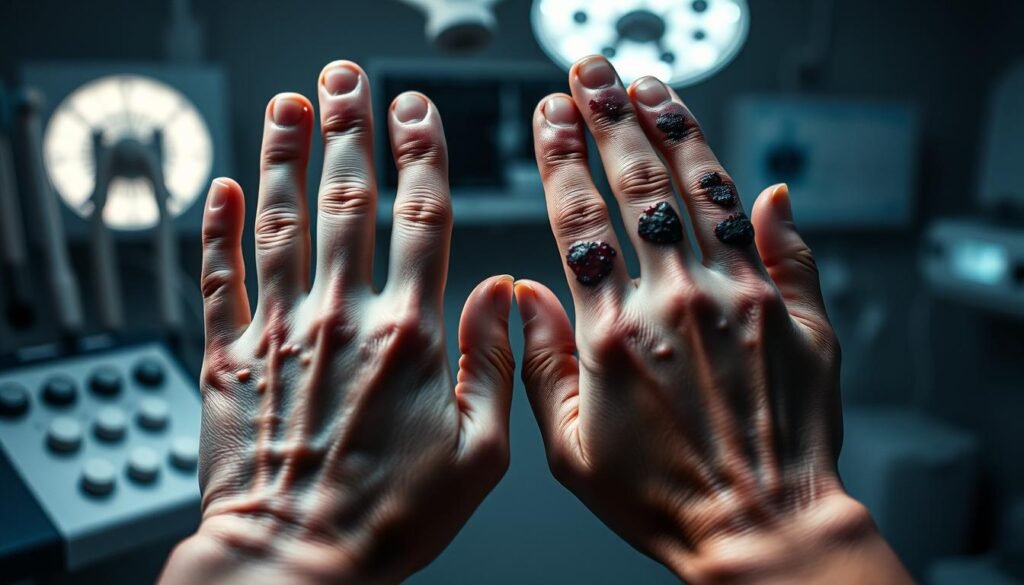
It’s key to know the signs of Vitamin B12 deficiency and cancer. This helps catch cancer early and make the right diagnosis. It’s important to tell apart the shared symptoms and the ones only found in one condition.
Overlapping Symptoms
B12 deficiency and cancer have some other concerning symptoms that are the same. This can make it hard to tell them apart. The common signs they share include:
- Fatigue and weakness
- Weight loss
- Digestive problems like constipation or diarrhea
- Anemia
These shared signs mean we must look at them with other symptoms and risk factors. Spotting the small differences plays a big role in catching cancer early.
Unique Cancer Symptoms
Some symptoms strongly suggest cancer, not just B12 deficiency. Knowing these can help spot cancer:
- Severe pain: Pain that doesn’t go away and lasts long can mean cancer.
- Lumps or unusual growths: Lumps in the breast, belly, or elsewhere are alarming.
- Changes in skin appearance
Looking at these cancer-only signs next to B12 deficiency symptoms helps doctors find and treat cancer early.
When to See a Doctor
Knowing when to see a doctor for a Vitamin B12 deficiency is key. It helps spot health conditions early, including cancer risks.
Persistent Symptoms to Watch Out For
If you feel tired all the time, weak, or have stomach problems, it’s important to see a doctor. These could be signs of a B12 deficiency. They could get worse if ignored. Also, look out for cancer signs like losing weight without trying or constant stomach pain.
The Importance of Early Testing
Early testing is very important to find a Vitamin B12 lack or cancer signs early. It leads to quick treatment and better health. If you notice symptoms, talk to a doctor. Taking the step to get tested early helps fix health issues before they grow big.
Diagnostic Tests for Vitamin B12 Deficiency
Finding out if you lack Vitamin B12 is key to knowing about many health problems. It may point to bigger health worries. Doctors use several tests to find out if you’re missing B12. These tests are crucial for spotting the sign of B12 troubles and figuring out why it’s happening.
B12 Blood Test
The b12 blood test usually starts the check-up. It checks how much Vitamin B12 is in your blood. This info is vital for doctors. If the b12 blood test shows low B12, you’ll need to investigate more.
Methylmalonic Acid Test
The methylmalonic acid test (MMA) is very important, too. If this acid is high in your blood or pee, it might mean you’re not getting enough B12. This problem can show up even before B12 levels in blood drop.
Homocysteine Levels
Checking homocysteine levels gives more clues. High homocysteine might mean you don’t have enough B12. That’s because B12 helps change homocysteine into something else. This test, with others, makes spotting B12 shortages easier.
Complete Blood Count (CBC)
A complete blood count (CBC) checks your general health. It looks for many issues, including anemia. With B12 shortage, a CBC might show big red blood cells, a problem often linked to not enough B12.
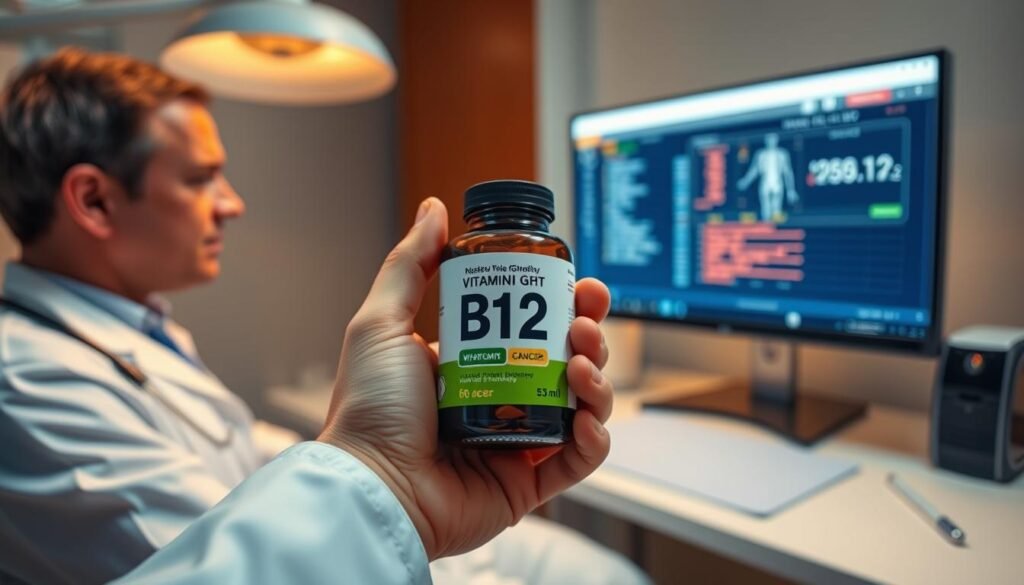
Treatment Options for Vitamin B12 Deficiency
Addressing vitamin B12 deficiency needs a specific plan to find and fix the cause. It’s important to know the different ways to treat B12 deficiency. This knowledge helps manage and beat this issue.
Dietary Changes
Often, changing what you eat can really help your B12 levels. It’s key to eat more B12-rich foods like meat, fish, eggs, and dairy. For vegans, B12-fortified cereals and nutritional yeast are great. These changes help keep B12 levels up.
Oral Supplements
If your diet doesn’t give you enough B12, taking pills can help. You can buy B12 supplements without a prescription or get them from a doctor. Taking these pills regularly stops deficiency and keeps your vitamin B12 level good.
B12 Injections
People with serious B12 deficiency or absorption problems might need shots. B12 shots go right into your muscle, avoiding the digestive system. This makes sure B12 gets into your blood fast. Getting these shots regularly can quickly fix symptoms and bring B12 levels back to normal.
Connection Between Immune System Function and Cancer
The immune system fights against cancer by spotting and attacking cancer cells. But, if it’s weak, the risk of chronic inflammation and cancer goes up. This makes keeping the immune system strong very important.
The immune system helps control inflammation. Too much inflammation can help cancer cells thrive. Knowing how the immune system and cancer are connected helps us find ways to improve our immune health and lower cancer risks.
Lacking Vitamin B12 can hurt our immune system. It makes it hard for our bodies to manage inflammation and cell growth. This can raise our chances of getting cancer. It shows how crucial Vitamin B12 is for keeping our immune system and health in top shape.
The connection between immune function and cancer highlights the need for managing Vitamin B12 levels. By eating well and possibly seeking medical help, we can fight inflammation and reduce cancer risks. Always check with a healthcare expert about your Vitamin B12 levels to avoid any problems.
Role of Vitamin B12 in Overall Health
Vitamin B12 is vital for your health. It helps your nerve function stay strong, keeping your nervous system healthy. Not having enough B12 can lead to numbness and tingling. This happens because your nerves aren’t working right.
Vitamin B12 also plays a big part in making energy. It turns what you eat into ATP, our cells’ energy. If you’re low on B12, you might feel tired and weak. That’s because your body isn’t making energy well.
Besides, Vitamin B12 is crucial for making red blood cells. These cells carry oxygen all over your body. Without enough B12, you could get anemia. This makes you feel tired and weak too.
For your heart, Vitamin B12 is super important. It keeps homocysteine, an amino acid, at low levels. High levels of it can lead to heart disease. So, B12 helps your heart stay healthy.
Let’s glance at Vitamin B12’s benefits:
| Health Aspect | Role of Vitamin B12 |
|---|---|
| Nerve Function | Supports nerve health and prevents neurological symptoms. |
| Energy Production | Enables conversion of dietary energy into ATP. |
| Red Blood Cell Formation | Assists in the production of healthy red blood cells, preventing anemia. |
| Cardiovascular Health | Helps maintain homocysteine levels, reducing heart disease risk. |
In short, getting enough Vitamin B12 is key for many body functions. It helps with everything from energy production to cardiovascular health. It also supports red blood cell formation. So, having enough B12 is very important for staying healthy.
Conclusion
The journey through understanding the impact of Vitamin B12 deficiency uncovers a profound link to your overall health, emphasizing its potential connection to various types of cancer. A shortage of this essential nutrient can lead to serious health issues, making it crucial to stay informed about the summary of B12 and cancer relationship. Awareness and proactive health management are key components in navigating these risks.
Your approach to preventive health measures can significantly influence your well-being. Incorporating a balanced diet rich in Vitamin B12, such as through meat, dairy products, and fortified foods, can help maintain adequate levels. Regular diagnostic tests, including B12 blood tests, Methylmalonic Acid tests, and Complete Blood Count (CBC), play a vital role in early detection and management of deficiencies.
It’s important to act swiftly on persistent symptoms and consult healthcare professionals to discuss any concerns, particularly regarding the potential cancer risks associated with prolonged Vitamin B12 deficiency. Prioritizing Vitamin B12 awareness and regular health checks empowers you to make informed decisions, ultimately reducing the risk of severe health outcomes.
FAQS
Can vitamin B12 deficiency be a sign of cancer?
Vitamin B12 deficiency isn’t usually a direct sign of cancer, but it can sometimes point to underlying issues, especially in the digestive system. Certain cancers may cause malabsorption that leads to low B12.
Is it common to have low B12 without having cancer?
Yes, low B12 is more often linked to poor diet, aging, or digestive problems than to cancer. Many people experience it and improve with treatment.
Is B12 deficiency ever the first warning sign of cancer?
In rare cases, yes. Some stomach or pancreatic cancers interfere with B12 absorption early on, making deficiency one of the first warning signs.
What should I do if I have low B12 and other symptoms?
If your B12 levels are low and you’re experiencing weight loss, bowel changes, or fatigue, it’s important to consult a doctor. These combinations could signal something serious.
Can diet help fix vitamin B12 deficiency?
Yes. Eating B12-rich foods like meat, dairy, eggs, or fortified cereals can help. If absorption is the problem, supplements or injections may be needed.
What tests check if my B12 deficiency is linked to cancer?
Doctors may use blood tests like MMA and homocysteine, along with imaging, antibody tests, or endoscopy if cancer is suspected. A full diagnosis depends on your symptoms and history.
When should I worry about low vitamin B12?
You should be concerned if low B12 comes with symptoms like extreme fatigue, unexplained weight loss, or digestive changes. These can signal deeper health issues.
Can cancer lower your B12 levels?
Yes, especially cancers that affect the stomach, pancreas, or intestines. These can interfere with how your body absorbs B12, leading to deficiency.
Is high B12 ever a warning sign of cancer?
Unusually high B12 levels can sometimes be linked to certain cancers, especially with metastases. It may act as a marker, not a cause.
Can low B12 cause anxiety or mood problems?
Yes. B12 supports brain function, and deficiency may cause depression, anxiety, confusion, or memory issues. These symptoms can improve with proper treatment.
Is it scary to be diagnosed with B12 deficiency?
It can feel stressful, but you’re not alone. Most cases are treatable, and early care can prevent long-term problems—even if a deeper cause is involved.
Does having B12 deficiency mean I have cancer?
No, it doesn’t. Most B12 deficiencies are due to diet, age, or digestive issues—not cancer. But it’s still important to get evaluated.
Can vitamin B12 deficiency increase my cancer risk?
Possibly. B12 helps with DNA repair and stability, so low levels might raise cancer risk slightly, especially for stomach or bowel cancer. The link isn’t fully proven yet.
Will taking B12 supplements prevent cancer?
Not necessarily. Supplements treat deficiency, but there’s no solid proof they prevent cancer. Some studies even link high-dose B12 to increased risk in specific groups like male smokers.
Can you have normal B12 levels and still have cancer?
Yes. Normal B12 doesn’t rule out cancer, and cancer can exist without affecting B12 levels. That’s why a full evaluation is key when symptoms are present.

